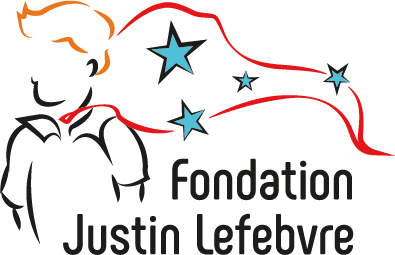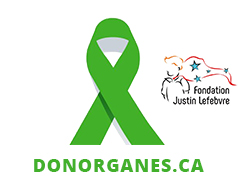FREQUENTLY ASKED QUESTIONS
You will find answers to the most commonly asked questions on organ and tissue donation.
HOW CAN I EXPRESS MY WISHES TO BE AN ORGAN AND TISSUE DONOR?
There are several ways to make your wishes known:
- Sign the sticker on the back of your health card card (received upon renewal of your card)
- Register with the RAMQ (Régie d’assurance maladie du Québec) by filling out a form when you renew your card or by requesting one on the internet. If you are already registered, you will no longer receive the form with your renewal.
- Register with the Notaries of Quebec Registry. There are no additional costs when you meet with a notary, and it is possible to register a consent or a refusal.
- Talk about it with your loved ones. If your wishes are not known to the various registries, health professionals will ask your loved ones.
AT WHAT AGE CAN CHILDREN SIGN THE STICKER ON THE BACK OF THE HEALTH INSURANCE CARD?
As soon as a child is able to write his/her name they can do so. Children under the age of 14 must have a legal guardian(s) initial it.
IF I SIGN THE CONSENT TO DONATE, WILL I RECEIVE ADEQUATE CARE IF I AM SERIOUSLY ILL?
A physician has a code of conduct that governs his or her profession. It states in part:
«……I will consider the health and well-being of my patient
as my priority;
I WILL RESPECT the autonomy and dignity of my patient;
I WILL ensure absolute respect for human life…»
By this text, you will understand that the signature on the card is looked at only at the end of life by health professionals and does not influence the care you will receive.
WHAT CAN WE CONSENT TO?
Consent can be given for the donation of vital organs (heart, lungs, liver, pancreas, kidneys, intestines), for tissue donation (eyes, bones, skin, heart valves), and donation for research. Relatives will be the spokespersons for the wishes of the deceased.
When signing the consent form, it is possible to express specific restrictions, for example, to agree to the donation of all organs and tissues except bones and skin. These restrictions will be discussed with the family and respected.
The donation of the body to science is not included. This requires contacting a university that deals with this type of donation.
A potential organ donor may donate :
| Reins | Generally, the two kidneys of a “deceased” donor will be transplanted to two different recipients. A living donor can donate only one kidney after a rigorous evaluation process that ensures that your health will not be jeopardized by the donation. The kidney was the first organ to be successfully transplanted in 1954. |
| Foie | The liver is usually transplanted to a single recipient. Occasionally, it can be divided into 2 to benefit 2 recipients. |
| Pancréas | The pancreas can be transplanted on its own. It can also be transplanted with a kidney in patients with diabetes and kidney failure. In addition, it is possible to remove only the pancreatic islets (the cells of the pancreas that secrete insulin) for transplantation. |
| Poumons | Generally, the lungs are given in pairs to one recipient, more rarely separated to two recipients. |
| Coeur | The heart can be transplanted on its own or in combination with lungs. |
CAN I DONATE ORGANS AND TISSUE IN ADDITION TO MY BODY TO SCIENCE?
No, it is not possible to do all three. It is important to know that when a person decides to donate his or her body to science, he or she cannot donate organs or tissues (with the exception of the cornea). To be accepted for donation of the body to science, the body must be intact and must not have undergone recent surgery.
It is possible for a person to put his or her wishes in order of priority. You could choose to put organ donation as the first choice and the donation of the body to science as the second choice, if the first is not possible since it is not possible to do both.
WHAT IS TISSUE DONATION?
A tissue donor is someone whose heart has stopped. Therefore, who has passed away. This person can donate one or more tissues of their choice. The tissues are transplanted by surgeons to treat living people.
Depending on the cause of death, there are several tissues that can be donated:
|
Types of tissues |
Why this tissue? |
Noteworthy |
| Ocular tissues | Degenerative eye diseases, accidents that cause injury to the cornea, repeated infection | It is the only tissue that can be harvested from people with cancer. |
| Skin | Skin grafts for burn victims | Mostly the skin of the back is taken (large surface). The thickness is 0.05 to 1.4 mm, equivalent to a scratch. Nothing is apparent if there is an open casket exposure of the deceased person. |
| Vascular tissues | Surgeries where vessels are required | |
| Tendons and ligaments | Orthopedic surgeries following a trauma (accident) | Harvested from the lower limbs only. |
| Bones | Orthopedic surgeries such as hip and knee replacements. | Removal of the femur and sometimes the tibia. Prostheses are put on after the removal. Can also be used to make glue which is used in the mentioned surgeries. |
| Cardiac valves | Necessary to replace valves in some people | High demand tissues for children born with heart defects. |
WHAT IS ORGAN DONATION?
Organ donation is only possible under certain specific circumstances.
The person must be hospitalized in a critical care unit and must be receiving life-sustaining treatment.
Organ donation is only possible in two circumstances: neurological death and circulatory death. These circumstances are likely to occur in the event of :
-
Cerebrovascular accident (CVA) including massive cerebral hemorrhage
-
Head trauma
-
Cerebral anoxia due to a lack of oxygen to the brain (cardiac arrest, drowning, hanging, intoxication)
-
Medical aid in dying (only this category does not require critical care hospitalization and life-sustaining treatment).
Organ donors can be classified into three categories:
-
Living donor
-
Brain-dead donor (neurological death)
-
Donor in circulatory arrest
WHO CAN BE AN ORGAN DONOR?
Unfortunately, very few people can become organ donors. In fact, you are 12 times more likely to need a transplant than to become a donor. In Quebec, approximately 1% of patients who die are eligible to become organ donors. In the majority of cases, these are people with a serious and irreversible brain injury. This injury may be severe enough to cause brain death (i.e. brain death or neurological death).
WHAT DOES "NEUROLOGICAL DEATH" MEAN?
Neurological death, brain death, is the complete and permanent cessation of all activities of the brain following a stop of blood supply to the brain.
CAN A PERSON RECOVER FROM BRAIN DEATH (NEUROLOGICAL DEATH)?
No. There are two ways to die. One is that the brain stops working first, brain death, but the heart has not stopped or has started after resuscitation.
The second way, the better known of the two, is cardiac arrest in which the heart has not restarted after resuscitation maneuvers.
Brain death, neurological death, is equivalent to cardiac death in the medical and legal sense.
HOW DO THEY ESTABLISH THAT I DIED BY NEUROLOGICAL CRITERIA?
Death by neurological criteria is a medical diagnosis. A physical examination is performed by two physicians. The examination was determined by Canadian experts who wrote the procedure according to the best practices of medicine.
The purpose of the tests performed is to confirm the absence of innate brain reflexes such as coughing, breathing or blinking. Without these reflexes, life is not compatible.
In special situations such as an inability to perform the full physical examination, additional tests will need to be performed. These tests are done in medical imaging (radiology).
CAN A PERSON WHO IS BRAIN DEAD (NEUROLOGICALLY DEAD) MOVE?
Sometimes a person who is neurologically dead may have movements in a part of their body (e.g., an arm, a leg). These movements are due to a reflex controlled by the spinal cord (like the hammer on the knee). It is not controlled by the brain.
ARE THERE MEDICATIONS THAT CAN MIMIC BRAIN DEATH (NEUROLOGICAL DEATH)?
Yes, certain medications such as narcotics (Fentanyl, Morphine) or anxiolytics (Midazolam, Lorazepam) taken excessively may give the physician the impression that the patient is brain dead. In this situation, the physician may either test the blood for the drug or perform medical imaging as mentioned in a previous question.
ONCE THE DIAGNOSIS OF NEUROLOGICAL DEATH IS CONFIRMED, IS THERE ANYTHING MORE THAT DOCTORS CAN DO TO SAVE MY LOVED ONE'S LIFE?
When the diagnosis of neurological death is confirmed, it is no longer possible to save your loved one’s life. The date and time on the death certificate is when the diagnosis was confirmed.
OTHER THAN BRAIN DEATH, IS THERE ANY OTHER TYPES OF DEATH THAT CAN ALLOW FOR ORGAN DONATION?
Yes, when the death is in controlled circulatory arrest. There are two ways to make this type of donation. The first is for a person who will have serious after-effects or for whom medical treatment could not prevent death. In this case, the medical team will be able to discuss the question of organ donation with the family after having decided to stop the treatment (donor in circulatory arrest). Once the decision to stop treatment has been made, the physician will assess the possibility of the person’s rapid death after the removal of life-supporting devices or medications. The death must be predictable within a short period of time to avoid suffering to the organs that could be transplanted.
The second way is a person who has been accepted to receive medical aid in dying and who does not have cancer. Death is assured with this method.
The donation option is part of end-of-life care.
CAN I BE AN ORGAN DONOR DURING WHILE ALIVE ?
Absolutely! Living donation is possible in Quebec. This donation can come from a family member or a good Samaritan. It is possible to donate a kidney, part of a liver (i.e. a lobe) or part of a lung. In Quebec, living kidney donation is available at the main university hospital centers.
CAN I BE A DONOR EVEN IF I AM 65 YEARS OLD AND HAVE CARDIOVASCULAR DISEASE AND DIABETES?
Absolutely! There are very few contraindications to organ donation. For example, a person with hepatitis or HIV can donate their organs if a recipient also has these diseases. All precautions are taken to avoid transmitting any disease in the organ donation process. So people with diabetes, high blood pressure, cholesterol can be eligible to donate organs
Did you know that the oldest donor was 92 years old and that he donated his liver? It is the quality and not the age of the organ that is considered.
WHAT CAN I EXPECT DURING THE DONATION PROCESS?
After obtaining consent from a loved one, there will be some important steps in the organ evaluation. Your loved one will answer various questions about your lifestyle and past illnesses. Several blood tests and x-rays will be done, most of them in the critical care unit. These tests are done in order to evaluate the functional level of your organs.
Sometimes, in light of this process, an organ cannot be transplanted because of the lack of a compatible recipient or because the organ is not functioning properly. The whole process takes an average of 2 to 3 days.
HOW DOES THE ORGAN ALLOCATION PROCESS WORK?
Transplant Quebec manages the unique waiting list on which all people waiting for a transplant in Quebec are placed. There are many allocation criteria to ensure equity for all and to respect ethical principles. Some of these criteria are blood, tissue and anatomical compatibility, the urgency of receiving the transplant and the medical condition of the donor.
HOW DOES THE TISSUE DONATION PROCESS WORK?
The tissue donation process begins after the heart has stopped. A professional will ask for your authorization to put you in contact with Héma-Québec. They will inform you about the rest of the process so that you can make a free and informed decision. At the same time, they will be able to answer all your questions.
Tissues are collected according to the request of the surgeons who use them. This may explain why, despite your loved one’s desire to donate tissue, it was not collected.
WHEN DOES THE ORGAN OR TISSUE DONATION PROCESS BEGIN?
The process begins only after the family has been informed of the possibility of donation and has given their consent.
IS THE DONATION CONFIDENTIAL?
Absolutely. No one will know that you were an organ donor unless your loved ones tell them.
DOES ORGAN OR TISSUE DONATION AFFECT THE APPEARANCE OF THE BODY FOR THE VIEWING AT THE FUNERAL HOME?
No. The removal of organs and tissues is done with respect and dignity of the body by a team of surgeons specialized in this type of procedure. The donation does not interfere with funeral practices and it is impossible to detect when the body is displayed.
WHAT ARE THE POSITIVE IMPACTS OF ORGAN AND/OR TISSUE DONATION ON BEREAVED FAMILIES?
Organ donation can have a positive impact on the grieving process of loved ones who have consented to donation. They may feel that life goes on in another way, that their loved one’s death was not in vain. The testimonies collected from loved ones show that, in the majority of cases, this gesture contributes to their comfort..
WHAT ARE THE NEGATIVE IMPACTS OF ORGAN AND/OR TISSUE DONATION ON BEREAVED FAMILY MEMBERS?
There may be a delay of one to two days between the death and the funeral home’s ability to retrieve the body. In addition, a negative reaction from the family at the time of the donation request can disrupt the grieving process. The resource nurses therefore work to promote the best possible context for making the request and avoid this situation.
WHAT IS THE DIFFERENCE BETWEEN THE RESOURCE NURSE AND THE QUEBEC TRANSPLANT COORDINATOR?
The Resource Nurse : The primary function of the Resource Nurses is to promote organ and tissue donation in their respective hospitals and to provide support to bereaved family members. Some of them have a regional role and serve several hospitals. The main task of the resource nurse is to accompany and support loved ones, to clearly explain the diagnosis of death and to give them all the information they need to make an informed decision regarding organ and/or tissue donation. Offering this end-of-life option, because it is also a choice of life!
The Transplant Québec Coordinator: Is responsible for applying the organ donation process, from the referral and identification of the potential donor to the allocation of organs. They are also responsible for training and informing professionals in the health and social services network about organ donation.
CAN THERE BE ORGAN AND/OR TISSUE DONATION IN THE CASE OF A SUSPICIOUS DEATH?
Yes, if neurological death is likely, then the coroner must be brought in quickly to avoid any contentious situation. By law, he has the power to authorize or refuse an organ and/or tissue donation. The coroner must issue an authorization number in order for the donation to take to place.
CAN CERTAIN RELIGIOUS PRINCIPLES BE OPPOSED TO ORGAN AND/OR TISSUE DONATION?
No religion prohibits organ donation. In fact, most religions consider organ donation to be a humanitarian act. However, some restrictions may apply. Consult your religious leader to find out exactly where your religion stands on this issue. As health care professionals, we must simply help loved ones make an informed decision and, above all, respect their decision.
Useful Links
In Quebec, there are a few websites (excluding FJL) that promote organ and tissue donation to the public.
Transplant Québec : http://www.transplantquebec.ca/
Héma-Québec : https://www.hema-quebec.qc.ca/tissus-humains/index.fr.html
Signez don : https://www.quebec.ca/sante/don-de-sang-de-tissus-et-d-organes/don-d-organes-et-de-tissus/
Canadian Blood Service : https://blood.ca/fr/organes-et-tissus
Fondation Canadienne du Rein : https://www.kidney.ca/quebec/dons-dorganes
Mission Dr Pierre Marsolais : https://missiondrmarsolais.org/
ASK YOUR QUESTIONS
Submit your own questions and we will answer them as soon as possible.



